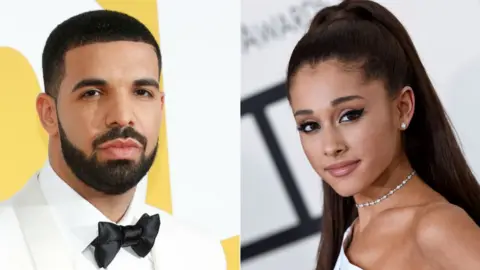Drake and Ariana Grande's record label drops the term 'urban'
 Getty Images
Getty ImagesRepublic Records, one of the most powerful record labels in the US, will stop using the word "urban" to describe music of black origin.
The company, which is home to Drake and Ariana Grande, says it will no longer use the term to describe "departments, employee titles and music genres".
"We encourage the rest of the music industry to follow suit," it added.
The term is often considered to be a generalisation that marginalises music by black artists.
"'Urban' is a lazy, inaccurate generalisation of several culturally rich art forms," radio presenter DJ Semtex told the magazine Music Business UK in 2018.
"I despise the word," he added. "I know artists that do hip-hop, grime, or rap. I don't know anyone that does urban music.
"The connotation of the word doesn't hold a positive weight," agreed Sam Taylor, a senior vice president at Kobalt Music, in an interview with Billboard in 2018.
"It's downgrading R&B, soul and hip-hop's incredible impact on music."
Allow Instagram content?

The term dates back to the mid-1970s, when black New York radio DJ Frankie Crocker coined the phrase "urban contemporary" as a label for the eclectic mix of songs that he played - which covered everything from James Brown to Doris Day.
At the time, the label didn't carry negative connotations but, after being shortened to "urban" it started being used as a catch-all for music created by black musicians - effectively lumping them into one category, regardless of genre.
Republic Records reflected the growing discomfort around the term in a statement announcing it would remove the word from its company vocabulary.
"'Urban' is rooted in the historical evolution of terms that sought to define black music," it said.
"As with a lot of our history, the original connotation of the term urban was not deemed negative. However, over time the meaning and connotations of 'urban' have shifted and it developed into a generalisation of black people in many sectors of the music industry, including employees and music by black artists.
"While this change will not and does not affect any of our staff structurally, it will remove the use of this antiquated term.
"We encourage the rest of the music industry to consider following suit as it is important to shape the future of what we want it to look like, as to not adhere to the outdated structures of the past."
'Important step forward'
The label, whose roster also includes The Weeknd, Nicki Minaj, Post Malone and Taylor Swift, also announced the formation of an "action committee" to address social justice issues.
Management company Milk & Honey, whose songwriters have contributed to hits by Drake & Rick Ross, The Chainsmokers, Dua Lipa and Selena Gomez also declared it would "formally eliminate the term 'urban' at our company".
In a statement posted to social media, it said: "We will no longer be using the term as we believe it's an important step forward, and an outdated word, which has no place in 2020 onwards."
Allow Instagram content?

The move comes in the wake of widespread protests in the US and UK over the death of George Floyd in Minneapolis two weeks ago,
A white police officer was filmed kneeling on Mr Floyd's neck for almost nine minutes, while the 46-year-old repeated several times, "I can't breathe". He was later pronounced dead in hospital.
His death prompted hundreds of thousands to take to the streets demanding racial justice.
The music industry responded by pausing work for a day last week, with Universal Music - Republic Records' parent company - establishing a "task force to accelerate our efforts in areas such as inclusion and social justice".

More on George Floyd's death
- VIEWPOINT: Tipping point for racially divided nation
- WATCH: 'This is why we are protesting'
- TIMELINE: Recent black deaths at hands of police
- BACKGROUND: Five pieces of context to understand the protests
- CRIME AND JUSTICE: How are African Americans treated?

However, others have said the industry needs widespread systemic change, rather than "window dressing".
"Why is it that black music generates millions and millions of dollars a year and yet none of the companies have a meaningful number of employees of colour, let alone in the executive suite?" asked senior music industry lawyer Ronald E. Sweeney in an open letter published on Sunday.
Sweeney, who has represented the likes of James Brown, P Diddy and Public Enemy, drew up a 12-point plan to address what he called "the elephant in the room", including equal pay and the creation of a three-year programme to train people from minority backgrounds for executive roles.
"[This] is what meaningful and real change looks like," he wrote. "So, let's see what you do."

Follow us on Facebook, or on Twitter @BBCNewsEnts. If you have a story suggestion email [email protected].
